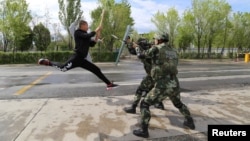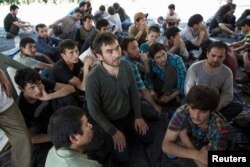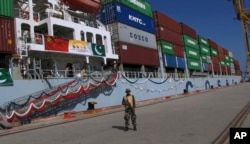A senior Chinese diplomat in Pakistan has taken to social media to reject as "baseless" Western allegations that China is committing massive human rights abuses in its neighboring northwestern Xinjiang border region.
Beijing is blamed by the U.S. and international rights defenders for reportedly running mass detention centers filled with ethnic Uighur and other Muslims to force them to denounce their religious beliefs.
In a series of tweets in the past few days, Deputy Chief of the Chinese Embassy in Islamabad Lijian Zhao described the charges as "groundless." Instead, he asserted the Chinese government "protects its citizens' right to freedom and religious belief and people of all ethnic groups enjoy freedom of religious belief in accordance with law."
Beijing maintains Xinjiang faces a serious threat from Islamist militants and separatists, who plot attacks and fuel tension between the Uighur community and members of the ethnic Han Chinese majority.
"Since the 1990s, thousands of terrorist incidents happened in Xinjiang. There is zero terrorist attack in 21 months," Zhao tweeted Tuesday. He went on to insist that sustained Chinese efforts have led to "social stability and a sound momentum" of economic development in the region.
However, it was not possible to independently verify statistics Zhao shared on social media.
Discussions are under way within the U.S. government on possible economic penalties in response to reports of Chinese rights abuses in Xinjiang.
A bipartisan group of U.S. lawmakers recently wrote to the State Department asking for it to impose sanctions on Chinese officials allegedly overseeing the policies in Xinjiang.
Beijing sees the U.S. using Xinjiang-related issues as interference in China's internal affairs.
Pakistan-based diplomat Zhao uses his Twitter account to disseminate information about progress on China-funded infrastructure projects under construction in Pakistan. He is regarded as a celebrity among Pakistanis because of his daily tweets on topics ranging from Pakistani economic to foreign policy issues.
Zhao swiftly responded to domestic and foreign critics of the China-Pakistan Economic Corridor who, among other things, complain the project is burdening Islamabad with expensive Chinese debt. Both Pakistani and Chinese officials maintain CPEC has created more than 70,000 local jobs and contributed to Pakistan's GDP growth stemming from Chinese grants, direct investment and concessional loans.
Beijing has already invested more than $19 billion in the past four years to help Islamabad build highways, energy plants and ports under the CPEC, that it declared flagship projects of President Xi Jinping's global Belt and Road Initiative.
The massive cooperation project will ultimately connect Xinjiang with the Chinese-built and operated southern Pakistani port of Gwadar on the Arabian Sea, giving Beijing the shortest access to international markets.
The CPEC is expected to bring more than $62 billion in Chinese investment to Pakistan by 2030 to build, among other projects, special economic zones to help improve and expand manufacturing capacity to enable Islamabad to increase exports to bring much-needed foreign exchange to the cash-starved country.
Pakistani citizens and small traders who regularly travel by road to Xinjiang complain of relatively harsh treatment by Chinese border authorities on arrival. Uighur men and women also used to frequently travel to Pakistan in large numbers until recently. But the Uighur travelers to Pakistan have dramatically declined in recent years, allegedly due to an anti-Muslim crackdown in Xinjiang.
Local media reports say some Uighur women married Pakistanis during their prolonged stay in the country, but years later when they went back to Xinjiang to see their parents, Chinese officials allegedly detained them for interrogation and their Pakistani spouses complain they remain uninformed about the whereabouts of their wives. The Chinese government has not responded to complaints reported in Pakistani newspapers.










